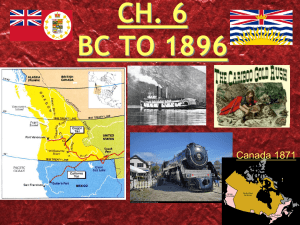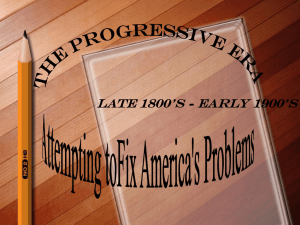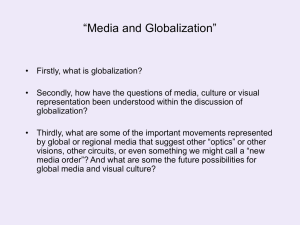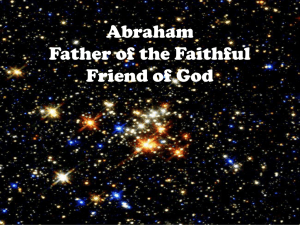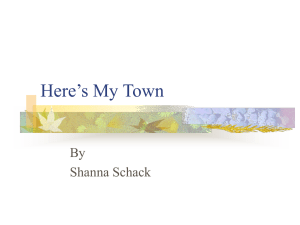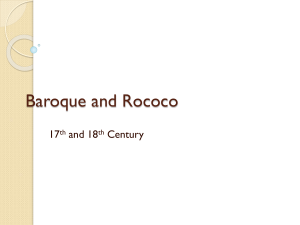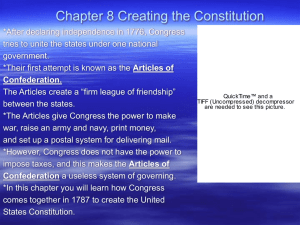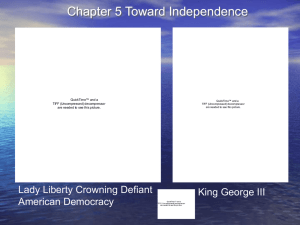Chapter 10 The Bill of Rights
advertisement
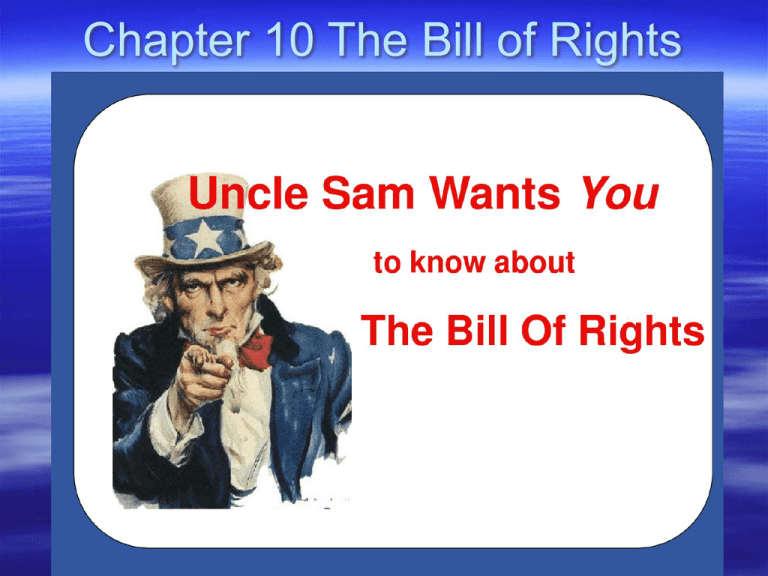
Chapter 10 The Bill of Rights Chapter 10 The Bill of Rights *The adoption of the Constitution depended upon ratification by 9 of the 13 states. *1788 Massachusetts convention objected that the Constitution did not list the rights of the people. *Governor John Hancock promised that if the delegates approved the Constitution as written then Congress would amend it to include the Bill of Rights. QuickTime™ and a TIFF (Uncompressed) decompressor are needed to see this picture. *”Ratify now, amend later” was the rallying cry for the Federalists. By the end of 1788 the Constitution was the Law of the land. Quick Time™ and a TIFF (Unc ompres sed) decompress or are needed t o see t his pic t ure. 10.2 Creating the Bill of Rights *1789 George Washington becomes the first president of the United States. *John Adams becomes the first vice president. *James Madison wants to keep his promise to add a Bill of Rights to the Constitution. *Congress approves 12 amendments in June, 1789. Ratification by the States *3/4 of the states must ratify amendments before they become law. *States debate for two years before ratifying 10 of the 12 in 1791. They become known as The Bill of Rights. Qui ckTime™ and a TIFF (Uncompressed) decompressor are needed to see this pictur e. James Madison Test Prep The person most responsible for writing the Bill of Rights was A) President George Washington B) Vice President John Adams C) Representative James Madison D) Governor John Hancock Answer: C) Representative James Madison Test Prep The Bill of Rights is part of the A) Proclamation of 1763 B) Declaration of Independence C) Articles of Confederation D) Constitution of the United States Answer: D) Constitution of the United States Test Prep The job of protecting the rights listed in the Bill of Rights belongs mainly to A) federal courts B) the president C) Congress D) state governors Answer: federal courts 10.3 First Amendment Rights *First Amendment combines five basic freedoms: -of religion -of speech -of the press -of assembly -right to petition the government The Right to Worship Freely *Congress cannot make an official religion of the United States. *Congress cannot favor one religion over another. *Congress can make no law prohibiting religious worship. QuickTime™ and a TIFF (Uncompressed) decompressor are needed to see this picture. QuickTime™ and a TIFF (Uncompressed) decompressor are needed to see this picture. QuickTime™ and a TIFF (Uncompressed) decompressor are needed to see this picture. QuickTime™ and a TIFF (Uncompressed) decompressor are needed to see this picture. 10.3 Continued… The Right to Free Speech and Press *Freedom of the press ensures that the press can act as a watchdog on the government. *Freedom of speech protects a citizen’s right to speak freely in public places. *However, the speech cannot endanger public safety. Free speech can also include actions, or expression, like peaceful protests. QuickTime™ and a TIFF (Uncompressed) decompressor are needed to see this picture. QuickT i me™ and a T IFF (Uncompressed) decom pressor are needed to see this picture. QuickTime™ and a TIFF (Uncompressed) decompressor are needed to see this picture. QuickTime™ and a TIFF (Uncompressed) decompressor are needed to see this picture. QuickTime™ and a TIFF (Uncompressed) decompressor are needed to see this picture. 10.3 Continued… The Right to Assemble and Petition *The right to assemble means that citizens can use public property for meetings and demonstrations. *The right to petition is the right to make a complaint to, or seek the assistance of the government without fear of punishment. *This can be done with propositions that the public vote on. QuickTime™ and a TIFF (Uncompressed) decompressor are needed to see this picture. QuickTime™ and a TIFF (Uncompressed) decompressor are needed to see this picture. QuickTime™ and a TIFF (Uncompressed) decompressor are needed to see this picture. Qui ckT ime™ and a T IFF (Uncompres sed) decompres sor are needed to s ee this picture. Test Prep The First Amendment protects all of these rights except freedom of A) speech B) worship C) assembly D) travel Answer: D) travel Test Prep Which of the following would not be protected by the First Amendment? A) criticizing government officials on a television talk show. B) promoting ideas that many Americans oppose in a political campaign. C) falsely crying “Fire” in a crowded theater. D) discussing controversial issues in a social studies class. Answer: C) falsely crying “Fire” in a crowded theater. 10.4 Citizen Protections Second Amendment: The Right to Bear Arms * ”A well regulated militia, being necessary to the security of a free state, the right of the people to keep and bear arms shall not be infringed (limited).” QuickTime™ and a TIFF (Uncompressed) decompressor are needed to see this picture. QuickTime™ and a TIFF (Uncompressed) decompressor are needed to see this picture. QuickTime™ and a TIFF (Uncompressed) decompressor are needed to see this picture. Test Prep The Second Amendment protects the right of citizens to own A) guns B) animals C) slaves D) land Answer: A) guns 10.4 Continued… Third Amendment: Quartering Troops in Homes * “No soldier shall, in time of peace, be quartered in any house without consent of the owner, nor in time of war, but in a manner prescribed by law” Fourth Amendment: Searches and Seizures *Protects people and their property from “unreasonable searches and seizures. *Before arresting a person or searching someone’s property, the police must show a judge that there is good reason for allowing the action. QuickTime™ and a TIFF (Uncompressed) decompressor are needed to see this picture. QuickTime™ and a TIFF (Uncompressed) decompressor are needed to see this picture. QuickTime™ and a TIFF (Uncompressed) decompressor are needed to see this picture. QuickTime™ and a TIFF (Uncompressed) decompressor are needed to see this picture. Test Prep The Fourth Amendment protects people and their property from A) unreasonable searches B) double jeopardy C) self-incrimination D) due process of law Answer: A) unreasonable searches 10.5 Legal Rights and Protections Fifth Amendment Legal Rights *Longest amendment in the Bill of Rights. *Right to a trial by jury. *No double Jeopardy *Prohibits self-incrimination. *Right to due process of the law. *Govt. cannot take private property “without just compensation.” QuickTime™ and a TIFF (Uncompressed) decompressor are needed to see this picture. QuickTime™ and a TIFF (Uncompressed) decompressor are needed to see this picture. QuickTime™ and a TIFF (Uncompressed) decompressor are needed to see this picture. QuickTime™ and a TIFF (Uncompressed) decompressor are needed to see this picture. QuickTime™ and a TIFF (Uncompressed) decompressor are needed to see this picture. 10. Continued… Six Amendment:Criminal Trials *Provides accused person with fair trials. *Right to a speedy and public trial by an impartial jury. *Defendant has right to: Know the charges against him/her. -Hear all witnesses who testify. -An attorney to assist in the defense. QuickTime™ and a TIFF (Uncompressed) decompressor are needed to see this picture. QuickTime™ and a TIFF (Uncompressed) decompressor are needed to see this picture. Seventh Amendment: Civil Trial Rights *Civil cases involve money. *People involved in civil cases have the fight to a trial by jury *Jury’s decision is final. QuickTime™ and a TIFF (Uncompressed) decompressor are needed to see this picture. QuickTime™ and a TIFF (Uncompressed) decompressor are needed to see this picture. Qui ckTime™ and a TIFF (Uncompressed) decompressor are needed to see this pi cture. Test Prep The “Miranda warning” reminds people who are arrested for a crime that they have the right to A) demand a retrial if they are found guilty. B) choose the judge who will set their bail. C) question witnesses during their trial. D) remain silent and not answer questions. Answer: D) remain silent and not answer questions. 10.5 Continued… Eighth Amendment: Bail and Punishments *No excessive bail before trial. *No excessive fines or cruel and unusual punishment after trial. *Punishment must be proportional to the crime. *Prohibits inhumane prison conditions. QuickTime™ and a TIFF (Uncompressed) decompressor are needed to see this picture. QuickTime™ and a TIFF (Uncompressed) decompressor are needed to see this picture. QuickTime™ and a TIFF (Uncompressed) decompressor are needed to see this picture. QuickTime™ and a TIFF (Uncompressed) decompressor are needed to see this picture. QuickTime™ and a TIFF (Uncompressed) decompressor are needed to see this picture. 10.6 Other Rights and Powers Amendment nine: Rights Retained by the People *Even though “certain” rights are listed in the Constitution, other rights not listed there are also retained (kept) by the people, like the right to privacy. QuickT i me™ and a T IFF (Uncompressed) decompressor are needed to see this pi cture. QuickTime™ and a TIFF (Uncompressed) decompressor are needed to see this picture. Qui ckTime™ and a TIFF (Uncompressed) decompressor are needed to see this pi cture. Test Prep The Ninth Amendment says that rights not listed in the Constitution A) can be added to it later. B) belong to the people. C) do not exist legally. D) are not very important. Answer: B) belong to the people. 10.6 Continued… Amendment ten: Powers Reserved to the States *Powers not given to the national government are “reserved to the states…or to the people.” *States determine rules for: -marriages -divorce -drivers licenses -voting -state taxes -job and school requirements -rules for police and fire departments. -and many more! QuickT ime™ and a T IFF (Uncompressed) decompressor are needed to see t his picture. QuickTime™ and a TIFF (Uncompressed) decompressor are needed to see this picture. Quick Time™ a nd a TIFF ( Un co mpr es sed ) d eco mp res so r ar e n eed ed to s ee thi s pi ctu re. Quick Time™ a nd a TIFF ( Un co mpr es sed ) d eco mp res so r ar e n eed ed to s ee thi s pi ctu re. 10.7 Chapter Summary *The promise of a bill of rights was key to getting the Constitution ratified by the states. *First Amendment spells out five basic freedoms enjoyed by all Americans. *Second, Third and Fourth Amendments specify protections for ordinary citizens against the abuse of government power. *Fifth through Eighth Amendments are intended to guarantee fair treatment for people who are involved in legal actions. *Ninth and Tenth Amendments concern the relationships among the federal government, the states, and the people. QuickTime™ and a TIFF (Uncompressed) decompressor are needed to see this picture.
